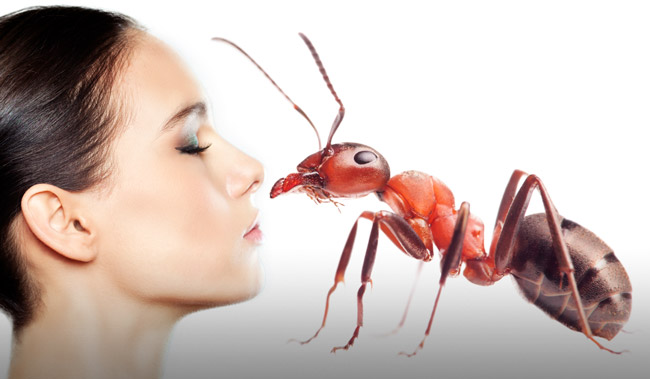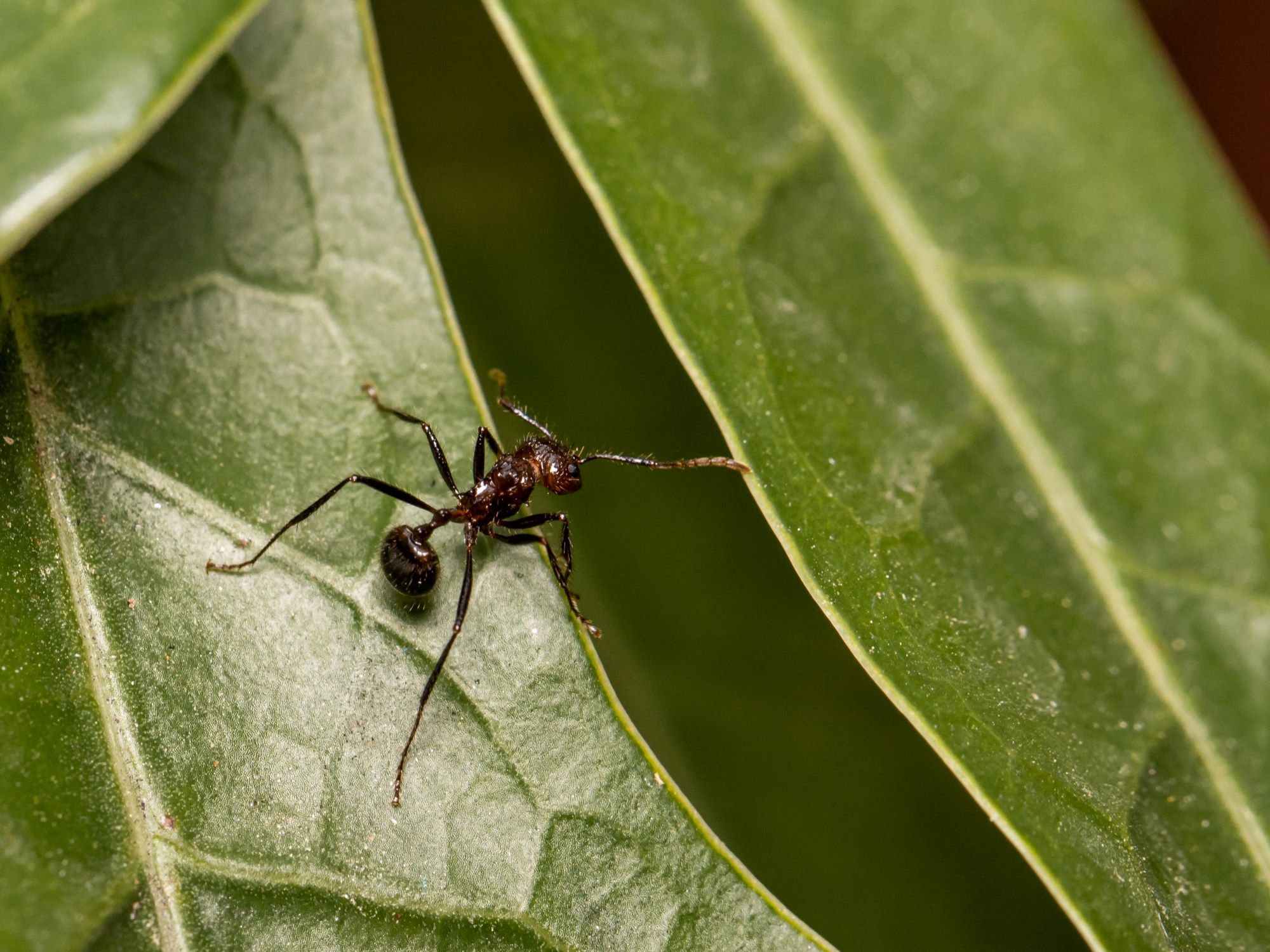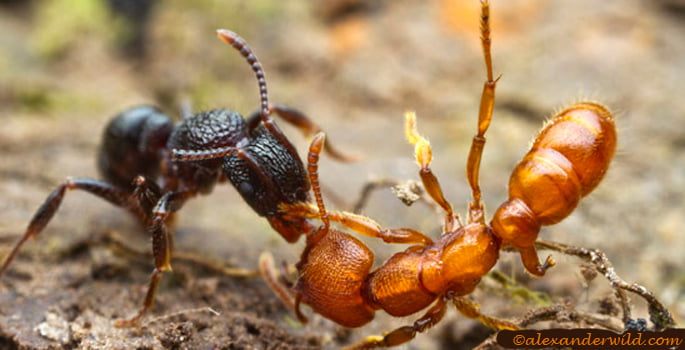Ants can smell thanks to their highly sensitive antennae. These antennae detect chemicals and help them navigate their environment.
Ants are incredible creatures, equipped with an advanced sense of smell that is crucial for survival. Their antennae, rich with receptors, act as sophisticated olfactory organs, allowing them to pick up on pheromones and other chemical compounds. This keen sense of smell aids in finding food, detecting predators, navigating their surroundings, and communicating within their complex social structures.
Understanding the olfactory capabilities of ants can give us insight into their highly organized colonies and the ways in which they maintain intricate networks of information-sharing and resource management. Their ability to smell plays a central role in their adaptability and success as a species.

Credit: boingboing.net
Ants’ Powerful Scent: More Than Meets The Antennae
Imagine a world where scent is the main way to communicate. That’s the world of ants! Ants use their antennae to smell, and it’s a super power in their tiny universe. With their antennae, they can find food, sense danger, and talk to each other. Let’s explore this fascinating feature of ants!
The Antenna: A Sensory Powerhouse
Ants’ antennae are remarkable. These are not just feelers, but highly sensitive scent detectors. Ants can pick up the slightest odors. Each antennae is packed with hundreds of sensory cells. These cells help ants to ‘smell’ the world around them.
- Pathfinding: They can find their way back to the nest by smelling trails.
- Food hunting: They pick up odor molecules from food sources.
- Recognizing friends and foes: They identify other ants by their unique scents.
Chemical Communication: The Language Of Pheromones
Ants are masters of chemical chat. They use pheromones to talk to one another. Pheromones are tiny chemical messages. Ants leave these chemicals on the ground. Other ants smell these messages with their antennae.
| Pheromone Purpose | Ants’ Actions |
|---|---|
| Alarm Pheromones | Warns ants of danger. |
| Food Pheromones | Leads ants to a tasty meal. |
| Trail Pheromones | Helps ants follow the correct path home or to food. |
Ants decode these pheromones to understand the message. It’s like reading a scent-based book. They make decisions based on these scents. This chemical language makes them one of the most successful groups of insects on the planet.

Credit: old.2ec.com.au
The Science Of Smell In Ants
The Science of Smell in Ants reveals the fascinating abilities of these tiny creatures. Ants communicate and navigate using their keen sense of smell. This plays a crucial role in their survival and social structure. Let’s discover how ants decode the chemical world around them and process scents to interact with their environment.
Olfactory Receptors: Decoding The Chemical World
Ants have olfactory receptors on their antennae. These receptors detect odors in their environment. Each receptor binds to a specific chemical molecule. This is how ants ‘smell’ the world. The variety of receptors allows ants to identify different smells. Ants can pinpoint food, identify friends or foes, and follow pheromone trails. This sense of smell is essential for their complex colony communication.
Processing Scents: The Ant’s Neural Pathway
Once an ant detects a scent, the signal travels to its brain. The brain has a specialized area to process smells called the antennal lobe. Similar to our olfactory bulb, this area sorts and interprets the scent signals. It guides the ant’s response to the smell, like finding food or alerting other ants of danger. The pathway from the receptor to the brain is direct, allowing them to react quickly to smells.
- Ants smell using antenna receptors
- Different receptors pick up various chemicals
- Antennal lobes in the brain sort scents
Pheromones: The Invisible Trails
Ants are among nature’s most proficient communicators. They use complex chemical signals, called pheromones, to speak without sound. These invisible trails of scent allow whole colonies to coordinate like a single organism. Ants can send detailed messages to their peers, directing traffic or raising alarm, all through the power of scent.
Trail Pheromones: Directing Traffic
Trail pheromones are the GPS system of the ant world. Worker ants lay down these invisible paths to guide their colony mates to food. Picture a tiny ant finding a large crumb. On its way back home, the ant deposits a chemical breadcrumb trail. This scent becomes a highway where each ant adds more pheromones, strengthening the path. Such precision in navigation ensures every ant follows the route to the food source efficiently.
Alarm Pheromones: The Scent Of Danger
In contrast to trail pheromones, alarm pheromones spell trouble. An ant releases these chemicals in response to a threat. This triggers an immediate reaction among its kin. Perception of these pungent signals sends nearby ants into a defensive or escape mode. Such quick communication can save the colony from predators or lead them to band together to fight the danger.
Roles And Responses: Ant Behavior And Odor
Ants live in a world ruled by scent. Their ability to smell is vital to their survival. This skill helps them find food, defend their home, and talk to each other. Let us explore how ants use smell in their daily tasks.
Foraging And Food Discovery
Ants are master foragers, thanks in large part to their sense of smell. When it comes to finding food, their noses lead the way.
- Worker ants leave the nest in search of sustenance.
- They release chemical trails called pheromones.
- These scent trails guide other ants to the food source.
Pheromones not only show the path but also tell how big the food is. Small food gets fewer chemicals. Big food gets more. This helps the colony decide how many ants to send.
Colony Defense: Smelling Intruders
Ants use smell to protect their home from enemies. Each colony has a unique odor. This odor acts like an ID card for ants.
- Guards smell each ant that comes.
- If the odor matches, the ant gets in.
- No match means the ant is an intruder.
Intruders could harm the nest. So, smelling them quickly is key. When guards detect outsiders, they send alert pheromones. The colony then attacks or defends.
Smell And Social Hierarchy
Ants use smell to organize their complex societies. Each ant colony operates like a well-oiled machine, and smell is key to maintaining order. The ants can identify each other and their roles through distinct scents. This is crucial for dividing tasks, caring for young, and defending their home. Let’s dive into the world of ants and explore how smell dictates their social hierarchy.
Queen Ants: The Royal Scent
The queen ant emits a special scent. This unique aroma signals her status to colony members. The other ants treat her with great care because of this scent. They provide her food, protect her, and even help her with egg-laying. This royal scent ensures the queen’s reign is undisputed.
Recognizing Colony Members
Ants recognize each other by scent. Every ant has a unique chemical profile that acts like an ID card. This scent-based ID helps ants determine friend from foe.
- Worker ants match scents to sort out tasks.
- Guard ants sniff out intruders, keeping the nest safe.
- Nurse ants use smell to care for the young.
Ants In Research: What We Learn From Their Smell
Imagine a world where tiny creatures hold secrets to advanced technology. Well, it’s not just imagination anymore. Ants, those small insects we often find in a line, are a treasure trove of information. Scientists study ants to understand their communication. Ants ‘talk’ through smells, using their antennas. This is fascinating for researchers. Let’s dive into how ants’ sense of smell guides them and what humans can learn from it.
Studying Ant Olfactory Systems
Ants have an outstanding sense of smell. They rely on this to find food, identify friends, and warn of danger. Here’s what scientists found:
- Ants can detect pheromones, which are like invisible chemical messages.
- Each ant colony has a unique smell. This helps ants know where they belong.
- Their antennas are like noses, full of sensors for sniffing out scents.
By studying these systems, scientists learn how to create better sensors. These sensors could detect harmful gases or pollutants in the air.
Applications In Robotics: Ant-inspired Algorithms
What do robots and ants have in common? More than you think! Scientists use ant-smelling abilities to teach robots. They develop algorithms based on ant behavior. This leads to new ways for robots to explore and adapt.
These are some uses:
- Robots that can find disaster survivors by smelling.
- Machines that identify dangerous chemicals quickly.
- Autonomous robots that communicate like ants do.
So, ants are not just critters on the sidewalk. They are inspiring a new wave of technology.
Ants teach us a lot, and we’re just getting started!
Ecological Impact Of Ant Scent Trails
The Ecological Impact of Ant Scent Trails cannot be overstated. Ants, tiny as they may seem, play a critical role in the health and sustainability of their ecosystems. By laying down scent trails, they communicate complex information. These trails guide other ants to food sources or alert them to danger. Ants’ ability to smell thus becomes pivotal in ecosystem dynamics.
Influence On Ecosystems
Ants are keystone species in their environments. Their scent trails affect various ecological aspects:
- Predatory behavior: Ants mark paths to food, impacting prey and predator dynamics.
- Resource distribution: Scent trails help optimize foraging, affecting how resources are spread in an ecosystem.
- Soil aeration: As ants travel, they aerate soil, improving plant growth.
The Role In Seed Dispersal
Seed dispersal is vital in ecological balance. Ants contribute to this process:
- Myrmecochory: This term describes seed dispersal by ants. Seeds often have nutrient-packed attachments that ants eat.
- Plant propagation: After consumption, ants leave seeds in fertile ground. This leads to plant growth in new areas.
Through these activities, ants enhance biodiversity and maintain ecological harmony.
The Evolution Of Ant Olfactory Capabilities
Ants are remarkable creatures, known for their complex social structures and ability to thrive in various environments. A significant factor contributing to their success lies in their highly evolved sense of smell. Ants rely on their olfactory capabilities to communicate, locate food, and navigate their world.
Survival And Adaptation
Ants have evolved a sophisticated sense of smell, which is crucial for survival. This sense allows them to:
- Find food by detecting odors over long distances.
- Communicate with pheromones, signaling danger or leading others to a food source.
- Navigate and map their environment effectively.
Olfactory receptors vary widely across different ant species, showing a specialization that aligns with their diverse lifestyles and environments. Research has uncovered that ant species with the largest olfactory receptor gene families tend to have the most complex social behaviors, indicating a direct link between smell and social adaptation.
The Future Of Ant Sensory Evolution
Ants continue to adapt their olfactory capabilities. Scientists study these changes to understand how environmental pressures shape sensory evolution. Insights from such research may lead to:
- New ways to manage pests as we learn how ants respond to different scents.
- Advancements in robotics, with ant-inspired algorithms for navigation and detection.
- Broader understanding of evolutionary biology and genetics.
Ants are paving the way for scientific discoveries with their tiny yet impressively evolved olfactory systems. As we uncover more about their capacity for smell, we may find innovative solutions to human challenges by mimicking these remarkable insects.

Credit: www.popsci.com
Frequently Asked Questions For Why Can Ants Smell?
How Do Ants Use Smell For Communication?
Ants rely on their sense of smell for communication through pheromones. These chemical signals help them alert others, find food, and organize their colony efficiently.
Can Ants Smell As Humans Do?
Ants have a more advanced smell perception to detect chemical signals, unlike humans who sense a broader array of non-chemical smells. Ants’ antennae are specialized organs facilitating their olfactory needs.
What Determines An Ant’s Sense Of Smell?
An ant’s sense of smell is determined by its antennae, equipped with sensory receptors tuned to different pheromones. This specialization enables them to interpret a myriad of chemical messages.
Why Is Smell Crucial For An Ant’s Survival?
Smell is vital for an ant’s survival, aiding in navigation, identifying members of their colony, locating food, and detecting enemies or threats. This olfactory ability is essential for their complex social structure.
Do Ants Use Their Sense of Smell to Avoid Cinnamon?
Yes, ants use their sense of smell to avoid cinnamon. The strong aroma of cinnamon disrupts their pheromone trail and confuses their communication. That’s why ants dislike cinnamon and tend to avoid areas where it’s present.
Conclusion
Understanding the olfactory capabilities of ants reveals the sophistication of these tiny creatures. Their ability to detect scents aids them in communicating, finding food, and maintaining their complex social structures. By exploring the wonders of ant smell, we gain insight into a world vastly different from our own but intrinsically linked through the shared importance of the senses.
{ “@context”: “https://schema.org”, “@type”: “FAQPage”, “mainEntity”: [ { “@type”: “Question”, “name”: “How do ants use smell for communication?”, “acceptedAnswer”: { “@type”: “Answer”, “text”: “Ants rely on their sense of smell for communication through pheromones. These chemical signals help them alert others, find food, and organize their colony efficiently.” } } , { “@type”: “Question”, “name”: “Can ants smell as humans do?”, “acceptedAnswer”: { “@type”: “Answer”, “text”: “Ants have a more advanced smell perception to detect chemical signals, unlike humans who sense a broader array of non-chemical smells. Ants’ antennae are specialized organs facilitating their olfactory needs.” } } , { “@type”: “Question”, “name”: “What determines an ant’s sense of smell?”, “acceptedAnswer”: { “@type”: “Answer”, “text”: “An ant’s sense of smell is determined by its antennae, equipped with sensory receptors tuned to different pheromones. This specialization enables them to interpret a myriad of chemical messages.” } } , { “@type”: “Question”, “name”: “Why is smell crucial for an ant’s survival?”, “acceptedAnswer”: { “@type”: “Answer”, “text”: “Smell is vital for an ant’s survival, aiding in navigation, identifying members of their colony, locating food, and detecting enemies or threats. This olfactory ability is essential for their complex social structure.” } } ] }
I’m MD Tanvir, and I bring years of expertise gained from working closely with pest control companies to the forefront. My journey in the industry has inspired me to launch Bug Battler, a platform aimed at equipping people with the know-how to combat pests autonomously. Through Bug Battler, I aim to empower individuals with practical insights to tackle pest infestations effectively.

